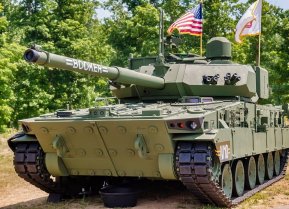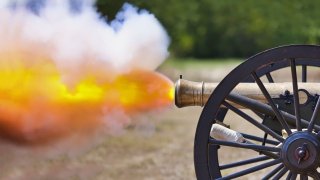The Deadliest Weapons of the Civil War: A Look at the Top 5
The Civil War, the deadliest conflict in American history, witnessed unprecedented carnage partly due to the innovative weaponry of the era. Despite the absence of modern warfare's hallmark technologies, the weapons of the Civil War significantly contributed to the high casualty rates.
Summary: The Civil War, the deadliest conflict in American history, witnessed unprecedented carnage partly due to the innovative weaponry of the era. Despite the absence of modern warfare's hallmark technologies, the weapons of the Civil War significantly contributed to the high casualty rates. Among these, the Springfield Model 1861 Rifle emerged as the standard infantry weapon, its mass fire tactics leading to substantial combat deaths. The Henry Repeating Rifle redefined firepower with its rapid-fire capability, making it an early precursor to the assault rifle. The LeMat Pistol, with its unique dual-functionality, offered a superior firepower option for Confederate forces. The Model 1857 12-Pounder "Napoleon" Gun combined mobility with lethal firepower, especially at close ranges against infantry. Lastly, the Gatling Gun introduced the concept of rapid, multi-barrel fire, paving the way for future machine gun designs. Together, these weapons shaped the battlefield tactics and outcomes of the Civil War, underlining the impact of technological advancements on warfare.
Revolutionary Firepower: How Civil War Weapons Changed Combat
The Civil War was by far the most deadly war in American history. The bloody four-year conflict between the northern and southern states of the America would end up consuming the lives of an astounding 2 percent of the prewar national population—620,000 dead and a further 1.1 million wounded.
The number of casualties is even more remarkable considering the most deadly weapons of the Industrial Revolution—the machine gun, the aircraft and the tank—hadn’t been invented yet. The Civil War had its share of deadly weapons.
From handguns to field artillery, here’s a look at the top five.
Springfield Model 1861 Rifle
The standard infantry weapon of a largely infantry war, the Springfield 1861 was likely responsible for the lion’s share of combat deaths. Roughly a million Springfields were built, arming the foot soldiers of both sides.
The Springfield was a .58 caliber rifle with a forty-inch barrel. It was loaded through the muzzle and fired by pulling the trigger, which struck a percussion cap and detonated the black powder charge. Because of the relatively inaccuracy of the weapon and the lack of marksmanship training for individual soldiers, it was usually used in massed fire tactics, which depended upon large numbers of soldiers firing simultaneously to saturate a target area.
Henry Repeating Rifle
The assault weapon of its time, the Henry Repeating Rifle was the fastest-firing weapon an infantryman could carry. Unlike the Springfield 1861, which was limited to 2-4 shots per minute, the Henry could empty its magazine of sixteen shots in less than a minute’s time. The result was a single man with the firepower of an entire squad of musketmen.
The Henry’s deadly nature lay in its innovative new design. Unlike the Springfield, which used separate black powder, a percussion cap and bullets, the Henry combined all three in a single .44 caliber metallic cylinder, what we would consider the modern ammunition cartridge of today. The Henry incorporated a lever-action loading system to lower the bullets into the breech, and had a tubular magazine that ran parallel to the barrel that held sixteen rounds.
Henry rifles were also carried by Sioux and Cheyenne warriors at the Battle of the Little Bighorn, where they annihilated Colonel George Armstrong Custer’s Seventh Cavalry Regiment. The rifle design was later picked up by Winchester and evolved into its iconic lever action rifle series, including the Model 1873, known as “The Gun That Won the West”.
LeMat Pistol
An unusual pistol design, the LeMat was designed by Jean Alexandre Le Mat of New Orleans. The pistol saw action with the Confederate Army and Navy, and was theoretically the most lethal handgun of the American Civil War.
The LeMat was a nine-cylinder .42 caliber revolver. Nine cylinders meant it could hold fifty percent more rounds than a typical revolver. The gun was actually two guns in one, because it had a second, larger, single-shot barrel capable of firing shotgun rounds. A selector switch on the side of the gun allowed the operator to switch back and forth between handgun and shotgun modes.
The Lemat was unwieldy, with the two firing mechanisms making it unusually weighty for a handgun. The weight of the cylinder made it rear-heavy, which likely helped aiming.
Model 1857 12-Pounder “Napoleon” Gun
Named after Napoleon III of France, the “Napoleon” Light Field Gun was a muzzle-loaded smoothbore cannon that fired a twelve-pound round. A mature design with design roots in French artillery (hence the nickname), it was considered safe and reliable, its physical size a good compromise between mobility and killing power.
The Napoleon was used by both sides during the war. It could fire solid metal shot, explosive shells, and grape and canister rounds. The barrel was sixty-six inches long and had a bore diameter of some four and half inches—about the same as the main gun on an Abrams tank. The entire gun and two-wheel mount weighed 2,350 pounds.
The Model 1857 had a range of 1,619 yards. It could fire up to four shotgun-like canister shots per minute, making it deadly against massed infantry at short ranges.
Gatling Gun
The predecessor of modern day multi-barreled machine guns and cannon, the Gatling Gun was invented in 1861 by Dr. Richard Gatling, a physician living in Indiana. Gatling allegedly created the gun under the naive assumption that making a single man—the Gatling gun operator—so lethal might cause wars to become obsolete. The gun saw very limited service in the Civil War, but was so influential in later designs it deserves a spot in this article.
The Gatling gun was a .58 caliber, six-barreled gun that worked by turning a hand crank that rotated the barrels. Each barrel would fire a single round before completing a single rotation, and the gun mechanism was fed by bullets in a gravity-fed hopper system.
The result was the deadliest weapon invented to date. When working properly, the gatling gun could fire six hundred rounds a minute—the equivalent to 150 trained infantrymen. The basic rotating barrel principle is alive today in the modern gatling gun, particularly the 20-millimeter M61 Vulcan seen in the Phalanx CIWS shipboard defense system and the 7.62-millimeter M134 Minigun.
About the Author: Kyle Mizokami
Kyle Mizokami is a defense and national security writer based in San Francisco who has appeared in the Diplomat, Foreign Policy, War is Boring and the Daily Beast. In 2009 he cofounded the defense and security blog Japan Security Watch. You can follow him on Twitter: @KyleMizokami.


